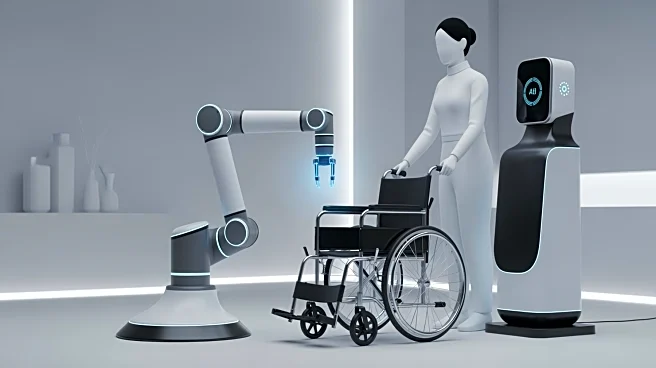What's Happening?
Artificial intelligence is transforming the caregiving landscape for America's 63 million caregivers, offering innovative solutions to ease their burden. Companies like Sensi.AI, NewDays, Care.Coach, and ElliQ
are developing AI-driven products that assist with fall detection, medication management, social companionship, and appointment coordination. These technologies aim to support caregivers by handling administrative tasks, allowing them to focus on meaningful connections with their loved ones. The AARP's AgeTech Collaborative is accelerating these advancements, highlighting the potential of AI to become a trusted partner in caregiving.
Why It's Important?
The integration of AI in caregiving addresses the growing challenges faced by caregivers, including burnout and financial strain. By automating routine tasks and providing emotional support, AI tools can significantly reduce the caregiving burden, improving the quality of life for both caregivers and those they care for. As more older adults express a desire to age in place, AI technologies offer a viable solution to ensure their safety and well-being. The widespread adoption of these tools could lead to a shift in caregiving practices, emphasizing the importance of technology in supporting aging populations.
What's Next?
As AI caregiving products continue to evolve, their adoption is expected to increase among caregivers and older adults. Companies will likely focus on enhancing the capabilities of their AI systems, integrating more personalized and responsive features. The AARP's AgeTech Collaborative will play a crucial role in supporting startups that are at the forefront of these innovations. Stakeholders, including healthcare providers and policymakers, will need to address potential challenges such as privacy concerns and the ethical use of AI in caregiving. The success of these technologies could lead to broader acceptance and integration into mainstream caregiving practices.
Beyond the Headlines
The use of AI in caregiving raises important ethical and cultural considerations, particularly regarding privacy and the human element of care. As AI tools become more prevalent, discussions around the balance between technology and personal interaction will be crucial. The potential for AI to democratize access to caregiving resources and support underserved communities is significant, offering new opportunities for inclusivity and equity in healthcare. Long-term, the integration of AI in caregiving could lead to a cultural shift in how society views aging and the role of technology in supporting older adults.









